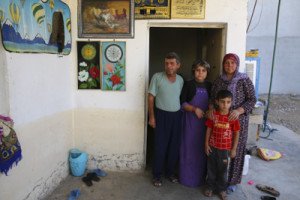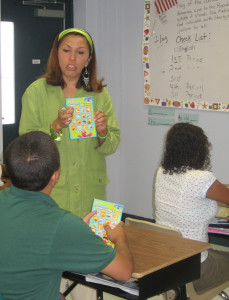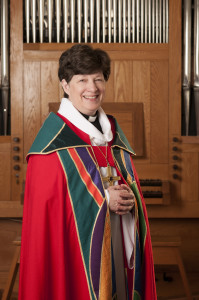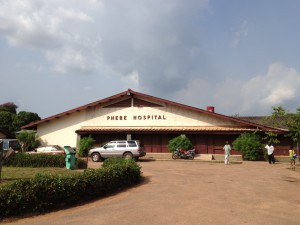Stephanie Opsal, Albuquerque, NM
Warm-up Question
How do you choose what to “like” or “follow” on social media?
Take the Invitation
How many times every day on Facebook are you asked to join a group, answer a friend request, or play the latest online game? Perhaps today more than ever, we are bombarded with invitations. Some are very significant, such as a family member’s wedding announcement, but many are very trivial: “[Insert name here] has invited you to play a game of Words with Friends.”
 Every request to which we answer “yes” implies an investment. When we choose to invest our time in a new friend or game we show what values are important to us. Do you spend all day playing online games? If so, you reveal that you enjoy and value those activities. Do you actually communicate with the “friends” or “followers” you have on Facebook, Twitter, or Instagram? If not, why did you say yes to their invitations?
Every request to which we answer “yes” implies an investment. When we choose to invest our time in a new friend or game we show what values are important to us. Do you spend all day playing online games? If so, you reveal that you enjoy and value those activities. Do you actually communicate with the “friends” or “followers” you have on Facebook, Twitter, or Instagram? If not, why did you say yes to their invitations?
In the same way that we are cautious about what personal information we reveal online, we need to be aware of how many different events, causes, groups, and friend requests we accept. “Likes” and things we “follow” reveal our personality and help form the identity that we represent to the world. Do you want to be known as a gamer? A soccer fan? A Christian? A supporter of cancer research? A follower of a famous actress? What you say “yes” to says a lot about your character.
For some games and applications, you have to sign contracts or consent to license agreements and stick to the program’s terms. When you’re in, you have to play by the rules. Think twice before automatically signing “yes” to every invitation that comes your way.
Discussion Questions
- Discuss some of the people you follow, things you support, or games you play on social media websites, such as Facebook or Twitter. What things do you check the most? Why?
- Do you ever “like” or “follow” something that you do not truly care about? Why or why not? Do you think this hurts anything?
Lectionary 28
(Text links are to Oremus Bible Browser. Oremus Bible Browser is not affiliated with or supported by the Evangelical Lutheran Church in America. You can find the calendar of readings for Year C at Lectionary Readings.)
For lectionary humor and insight, check the weekly comic Agnus Day.
Gospel Reflection
In our Gospel story, Jesus tells a parable about a wedding feast. A king is throwing a banquet for his son, but the guests he had previously invited now refuse to come. Twice he sends servants to the intended guests, telling them it is time to come to the celebration. Instead of jumping on board, they go off on their own way. Some even brutally attack the messengers. The king destroys those murderers and burns the city.
The king tells his servants to go out to the streets and invite everyone they can. The servants bring in many new people, of both good and bad reputations, and fill the banquet hall. Though many are poor, dirty, or stuck in sin, the king gives them a place at his banquet table.
Happy ending, right? Not quite. One new guest does not put on the wedding garments. In this historical context, the host always gave guests specific garments that were to be worn for weddings. This clothing was free and readily available for all guests. All were expected to wear them. A guest who chose not to wear the garment would come across as arrogant, as if he or she was too good to wear the standard dress. The guest would suggest that he or she did not truly want to take part in the ceremony.
The unfortunate fellow who did not wear the wedding garments was tied up and thrown out of the feast. The issue was not that the newly-invited man from the street could not afford the right clothing, but rather he was given the proper attire as a gift and yet chose not to wear it. He thought he could do whatever he wanted, when he actuality needed the son’s covering to receive his place.
This parable is a beautiful illustration of God’s story of saving you and me. The book of Revelation talks about the Son of God having a magnificent wedding feast to reunite Christ and his beloved bride, the church, at the end of time:
“‘Hallelujah! For our Lord God Almighty reigns. Let us rejoice and be glad and give Him glory! For the wedding feast of the Lamb has come, and His bride has made herself ready. Fine linen, bright and clean, was given her to wear.’ Then the angel said to me, ‘Write: ‘Blessed are those who are invited to the wedding supper of the Lamb!” And he added, ‘These are the true words of God.'”– Revelation 19:6B-9 (NIV)
Jesus offers an open invitation to his eternal wedding feast, but people have to come ready, clothed in his fine linen, which is Christ’s righteousness. When Christ died on the cross for all the world’s sins, He made His people clean, covered by His righteousness. They need only they believe that it is true and accept that righteousness. 2 Corinthians 5:21 says, “God made Him [Jesus] who had no sin to be sin for us, so that in Him we might become the righteousness of God.”
The parable suggests that Jesus invites everyone to come to His feast, both the religious people you might expect to follow God and the broken, weary, sinful, sick, poor, and dirty people. All are welcome in God’s house.
Two conditions prevent the parable’s potential guests from enjoying the banquet. The original guests say “no,” quite possibly more concerned about their own money and well-being than God’s desires. As a result, the king declares, “Those invited were not worthy,” (v. 8). The improperly clothed man got a free invitation but spoiled his chances by not wearing the required, yet freely available, attire.
What does this mean for us? Christ offers all an invitation to follow Him. He loves us so much that he keeps offering open invitations. However, we cannot get into the party by our own merit. We are saved by his work, but we do have to accept the gift. Otherwise we will be left, like the invited, no-show guests at the beginning of the parable or the unprepared man at the end.
Give your life to following God. Accept that you need Christ’s forgiveness of sins to receive heaven. This is one invitation you cannot pass up.
Discussion Questions
- Why would the first invited group of guests refuse to come? Why do people choose not to follow Jesus and accept His gift of eternal life?
- Do you think it was fair that the improperly dressed man was abusively kicked out of the banquet?
- Discuss what you think the final verse (v. 14) means: “For many are invited, but few are chosen.”
- Can we follow Christ half-heartedly as we do with many of our social media interests?
Activity Suggestions
- Look up your own most-used social media profile page, such as Facebook, Google Plus, Twitter, or Pinterest. View your page objectively, as if you had never seen it before. How would you describe yourself, based on the things you see written on the page, causes you support, and people with whom you interact? Think about what your page says about your outlook on life, values, attitude, faith, friendships, and identity. Is your page an accurate representation? If not, why not? Decide what image you want the world to see. Are there some things you would like to change? Change things, delete things you no longer commit to, and refresh your social media identity to be who you want to be.
- Draw a picture of a “wedding garment” or make a list, and write or draw things about yourself and God that you want to represent to the world. What are some qualities of Christ’s righteousness? Search your Bible for Jesus’ character traits, and write things that you want to increase in your life, (e.g. love, forgiveness, kindness).
Closing Prayer
Jesus,
We praise you for teaching us about yourself and your ways through parables. Lord, we want to follow you whole-heartedly, know your love for us, and sit at your heavenly wedding banquet. Help us to live in your way and invite others to know you. We love you. In Jesus’ name we pray. Amen.









 dynamic ELCA World Hunger team in Chicago! I will be serving as a Program Assistant for the next year through a placement with the Lutheran Volunteer Corps (LVC). I am honored to be the first LVC member to work with ELCA World Hunger and am excited about all the year has in store. I will be working with Education and Constituent Engagement.
dynamic ELCA World Hunger team in Chicago! I will be serving as a Program Assistant for the next year through a placement with the Lutheran Volunteer Corps (LVC). I am honored to be the first LVC member to work with ELCA World Hunger and am excited about all the year has in store. I will be working with Education and Constituent Engagement.